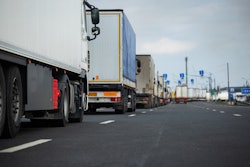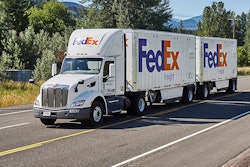
The trucking technology environment in 2024 was very active as the industry saw multiple consolidations, increased introduction of artificial intelligence and the resulting cybersecurity concerns and more. Taking a look back at the year as we prepare to move into 2025, these are the top five trends in the trucking tech space that stood out.
M&A
Several trucking technology vendors consolidated in 2024, and even more M&A activity is expected in the coming year. One of the biggest deals of the year came in the latter half when Platform Science announced its plans to acquire Trimble’s telematics business in a transaction that is expected to close in 2025. Another notable transaction was Bestpass-Fleetworthy’s acquisition of Drivewyze.
At the beginning of the year, Clarience Technologies acquired Safe Fleet, and rounding out the year, DAT Freight & Analytics acquired Trucker Tools. There were a few more transactions in between – several noted in this recent story about how these consolidations will impact the trucking industry.
Emissions
One of those consolidations included Zonar, currently one of only a few telematics providers certified to participate in the California Air Resources Board (CARB) Clean Truck Check (CTC) program in which commercial heavy- and medium-duty vehicles traveling to or through California will be required to report results of emissions testing.
CARB recently certified Geotab as another telematics provider in its CTC program. Though only a few continuously connected (CC) devices (like Geotab and Zonar) – a telematics device that is assigned to one vehicle for ongoing testing events – have been certified, CARB doesn’t anticipate a lack of testing equipment when periodic emissions testing requirements become effective. Carriers can also use non-continuously connected (NCC) devices – handheld shop tools that can be used for testing events on multiple vehicles – to scan for emissions. Here’s a deeper look at which type of device is better for your fleet from a tech perspective.
AI
Emissions are a big deal across the trucking industry, but AI has quickly taken hold as a major emerging trend among carriers and their technology providers. Autonomous (AV) and battery-electric (BEV) trucks were all the hype in 2022 and 2023, but AI has risen to the top of the acronym chart as the industry continues to work out all the kinks with deploying those technologies.
Reports from Motive and Samsara predicted that companies, including those in the trucking sector, would look to more heavily invest in AI in 2024 and the coming years. AI has been a hot topic at technology vendors’ user conferences this year as well, including McLeod Software, where a panel of experts said right now is the time to deploy artificial intelligence for telematics systems.
Volvo recently invested a significant amount in Texas-based tech-powered trucking company aifleet, and transportation company Ryder implemented AI in its yard operations, using fixed cameras at the gate to automatically index and analyze trucks and trailers.
Dash cameras
While AI isn’t new, it is improving. Many trucking technology providers have implemented AI in its dash cam products in recent years to detect things like eye movement to determine if a driver is drowsy, among other things.
[RELATED: How in-cab AI is transforming the trucking industry]
Dash cameras remain a top concern for fleets as to whether they should use them. Though this is a years-long debate, it isn’t one that will go away any time soon as it affects driver retention, which is consistently a top issue for carriers.
Some carriers’ leadership believe with the adoption of additional technologies, driver-facing cameras can be avoided, while others believe it to be an absolute necessity. You can read more about that debate in this 2024 CCJ article. In another CCJ article, those fleet leaders discussed alternatives in using dash cameras and how to effectively deploy them with driver buy-in.
Cybersecurity
AI and dash cameras step into the cybersecurity space.
Cybersecurity continued to evolve in 2024 as experts warned trucking companies about existing and new methods from bad actors. While the age-old method of ransomware attacks remained the top cybersecurity trend in trucking for 2024, AI emerged as an increasing concern for 2025. AI is expected to increase the frequency of cyber incidents and cyber insurance claims.
Bad actors are using AI to create more efficient and better methods of attack. Phishing attacks are becoming more sophisticated using AI, making the telephone one industry expert’s best friend, while it’s another’s worst nightmare because of AI voice spoofing. The National Motor Freight Traffic Association said voice spoofing, among other methods of attack, was a rising concern in its 2024 cybersecurity predictions.











